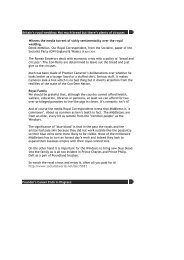New meanings of Panafricanism in the era of globalisation
New meanings of Panafricanism in the era of globalisation
New meanings of Panafricanism in the era of globalisation
You also want an ePaper? Increase the reach of your titles
YUMPU automatically turns print PDFs into web optimized ePapers that Google loves.
<strong>in</strong>formation society <strong>the</strong>sis à la Castells (1997) to orthodox Marxist <strong>the</strong>ories <strong>of</strong><br />
“ov<strong>era</strong>ccumulation” (Bond 2001:4-10).<br />
Although I assume that as a concept, or at very least as a gen<strong>era</strong>lised notion, <strong>the</strong> term<br />
“<strong>globalisation</strong>” does not require elaboration, I should like to list those aspects <strong>of</strong> <strong>the</strong><br />
phenomenon that are most relevant to <strong>the</strong> purpose <strong>of</strong> this address. To beg<strong>in</strong> at <strong>the</strong><br />
economic level, it is essential that we state clearly that <strong>the</strong> capitalist mode <strong>of</strong> production<br />
as described classically first by Ricardo and subsequently ref<strong>in</strong>ed <strong>in</strong> decisive ways by<br />
Marx and Engels has not changed at all. This mode <strong>of</strong> production refers to <strong>the</strong> collective<br />
production <strong>of</strong> use values (“goods”) by <strong>in</strong>dividuals who, <strong>in</strong> return for wages, sell <strong>the</strong>ir<br />
labour power to a class <strong>of</strong> people, who own <strong>the</strong> means <strong>of</strong> production, and who <strong>in</strong> turn, as<br />
<strong>the</strong> private owners <strong>of</strong> <strong>the</strong> labour power sold to <strong>the</strong>m appropriate surplus value (<strong>the</strong><br />
difference between <strong>the</strong> price <strong>of</strong> labour and <strong>the</strong> total (exchange) value <strong>of</strong> <strong>the</strong> “socially<br />
necessary” labour <strong>in</strong>putted <strong>in</strong> <strong>the</strong> product (commodity). In spite <strong>of</strong> <strong>the</strong> many technical<br />
permutations that have evolved dur<strong>in</strong>g <strong>the</strong> last century <strong>in</strong> particular, this is <strong>the</strong> generic<br />
mode <strong>of</strong> produc<strong>in</strong>g pr<strong>of</strong>it, <strong>the</strong> ultimate aim <strong>of</strong> all capitalist enterprise. Globalisation, at<br />
this level, refers simply to <strong>the</strong> <strong>in</strong>creas<strong>in</strong>g <strong>in</strong>tegration <strong>of</strong> all economic and social<br />
formations <strong>in</strong>to <strong>the</strong> world capitalist economy, i.e., it has to do with <strong>the</strong> complexification -<br />
which is also an unprecedented simplification – <strong>of</strong> <strong>the</strong> capitalist system, viewed <strong>in</strong> its<br />
totality. This drive towards ever <strong>in</strong>creas<strong>in</strong>g <strong>in</strong>tegration is steered by <strong>the</strong> dom<strong>in</strong>ant<br />
economies <strong>of</strong> <strong>the</strong> tripolar world but especially by <strong>the</strong> USA. The governments <strong>of</strong> <strong>the</strong><br />
relevant countries, whatever else <strong>the</strong>y might be, are no less than <strong>the</strong> political<br />
representatives <strong>of</strong> <strong>the</strong> owners <strong>of</strong> <strong>the</strong> 200 or so major trans-national corporations <strong>in</strong> <strong>the</strong><br />
world, s<strong>in</strong>ce <strong>the</strong>se are <strong>the</strong> real drivers <strong>of</strong> <strong>the</strong>se processes.<br />
The neo-lib<strong>era</strong>l economic orthodoxy, which <strong>in</strong>forms virtually every macro-, meso- and<br />
micro-economic environment on <strong>the</strong> globe has atta<strong>in</strong>ed <strong>the</strong> status <strong>of</strong> common sense. To<br />
quote a recent article by three South African analysts, we have as an abstract model<br />
… a lib<strong>era</strong>l political dispensation accompanied by a deregulated<br />
market economy with m<strong>in</strong>imal state/government <strong>in</strong>tervention as <strong>the</strong><br />
norm for countries <strong>in</strong>tent on engag<strong>in</strong>g with <strong>the</strong> global economy.<br />
5
















